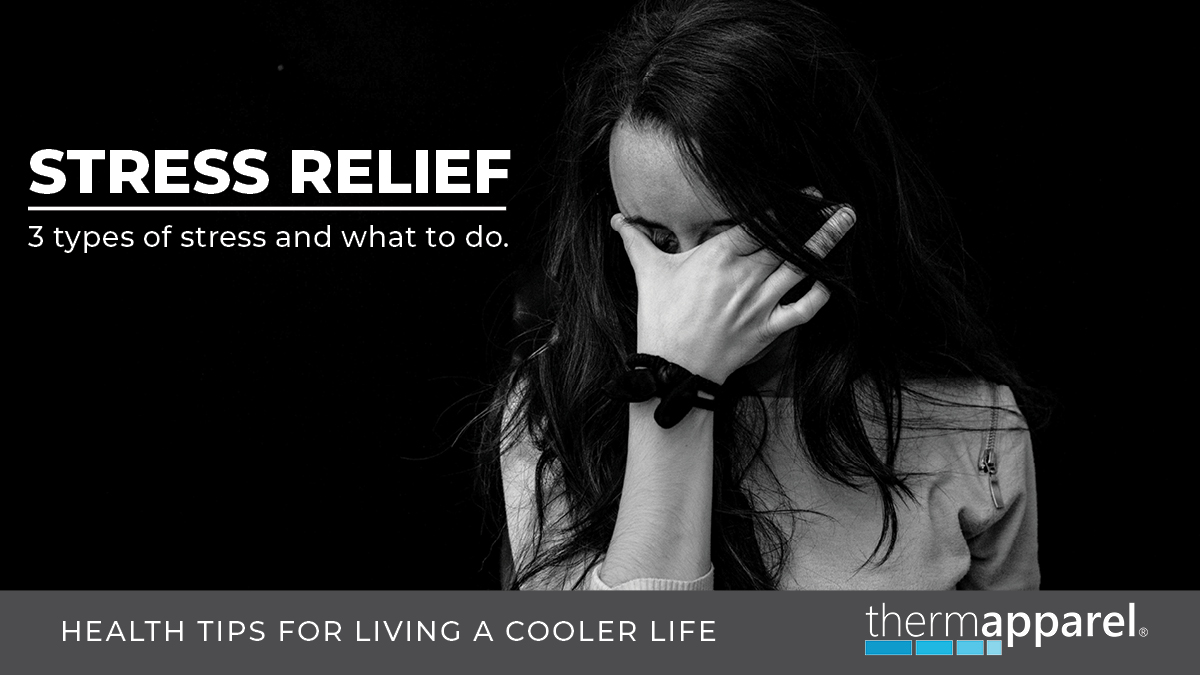November 4, 2019

Stress is your body's reaction to a challenge or demand. In short bursts, stress can be positive, such as when it helps you avoid danger or meet a deadline. But when stress lasts for a long time, it may harm your health.
According to the American Psychological Association, the three types of stress — acute stress, episodic acute stress, and chronic stress
Acute Stress
This is short-term stress that goes away quickly. You feel it when you have to speak in front of a large crowd, have a close call on the road, have a fight with your partner, or ski down a steep slope. It helps you manage dangerous situations. It also occurs when you do something new or exciting. All people have acute stress at one time or another. The symptoms are physical, emotional, and/or behavioral, but are typically short-lived.
- Symptoms of acute stress might include:
- Irritability
- Anger
- Frustration
- Sadness
- Tension headaches
- Jaw or neck pain
- Heartburn
- Rapid heartbeat
- Sweaty palms
- Dizziness
- Shortness of breath
Episodic Acute Stress
This occurs when someone gets frequent bouts of acute stress. People with this kind of stress will oftentimes take on more responsibilities and projects than they can handle. They may seem like they’re constantly in a rush, always running late, and are disorganized. People with episodic acute stress can also be hostile towards others and have strained relationships.
Symptoms of episodic acute stress might include:
- Tension headaches
- Migraines
- Hypertension
- Heart disease
Chronic Stress
This is stress that lasts for a longer period of time. You may have chronic stress if you have money problems, an unhappy marriage, or trouble at work. Any type of stress that goes on for weeks or months is chronic stress. You can become so used to chronic stress that you don't realize it is a problem.
Symptoms of chronic stress might include:
- Anxiety
- Depression
- Heart disease
- Weight gain or loss
- Stroke
- Sleep issues
- Memory and concentration issue
Signs of too much stress
Stress can cause many types of physical and emotional symptoms. Sometimes, you may not realize these symptoms are caused by stress.
Health symptoms that might be stress related:
- Diarrhea or constipation
- Forgetfulness
- All over aches and pains
- Headaches
- Lack of energy
- Sexual issues
- Sore jaw or neck
- Exhaustion
- Sleep issues
- Upset stomach
- Use of alcohol or drugs to relax
- Weight gain or loss
Simple things you can do to relieve stress:
Exercise This is usually the last thing you want to do when you feel stressed but it can be the most beneficial. Exercise lowers your body stress hormones such as cortisol and also helps release endorphins when are chemicals that improve you mood and act as natural painkillers. Exercise can also improve your sleep quality which can be affected from stress. Dust off your walking shoes and go for a daily 20 min walk, any activity that includes repetitive movements of large muscle groups will do the trick.
Reduce your caffeine intake
Caffeine is a stimulant found in chocolate, energy drinks, tea and coffee. Too much can cause feeling of anxiety. Switch out one of your cups of coffee with a cup of water and increase your water intake daily.
Write it down
Write out what you’re stressed about.
Write out the things that need to get done so you don’t feel stressed.
Write down what you are grateful for. Gratitude can help relieve stress by focusing your thoughts on whats positive in your life.
Spend time with friends and family
Social support from friends and family can help you get through stressful situations. Being apart of a network of friends and family gives you a sense of belonging and self worth which can really help in the rough times.
Laugh
It’s hard to feel stressed or anxious when you are laughing. It helps to relieve your stress response and tension by relaxing muscles.
Stay on top of your priorities and stop procrastinating
Procrastination compounds and leaves you rushing to catch up and feeling stressed and overwhelmed which can affect your health and sleep. Make it a habit to make a to-do list. Write it all down, get it all out and down on paper. Then give them a priority and give yourself realistic deadlines and work your way down the list. Crossing off an item on a to-do list can improve your mood and lower stress levels.
Deep Breathing
Stress activates your sympathetic nervous system, signaling your body to go into fight-or-flight mode. Deep breathing can activate your parasympathetic nervous system which controls your relaxation response. The goal of deep breathing is to concentrate on your breath, make is slower and deeper. It helps slow your heart rate and lets you refocus.
Wearing an undercool vest gives your heart a break by cooling down your blood.
It's not about feeling cold. It's about feeling good.
ThermApparel is a small business making big waves in the heat sensitivity world by designing the first lightweight, comfortable and invisible cooling vest, UnderCool. Check us out online, on our blog, or on Facebook, Twitter, Pinterest, LinkedIn and Instagram.
Please let us know if you have any other questions or ideas in the comments below, we will follow up. You can always reach us via:
Live Chat - www.thermapparel.com | Email - contact.us@thermapparel.net | Phone - 855-232-7233 | Address: ThermApparel LLC. 40 Franklin St. 4th Floor, Rochester, NY 14620

